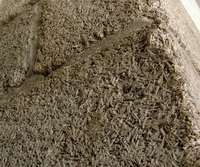 Standing outside a warehouse, Scorpions head Leonard McCarthy held up a shrink-wrapped, one-kilogramme brick of dagga and smiled for the cameras.
Standing outside a warehouse, Scorpions head Leonard McCarthy held up a shrink-wrapped, one-kilogramme brick of dagga and smiled for the cameras.Behind him, workers inside the building were pushing four tons of the drug into a furnace to be incinerated - about 3 900 bricks with an estimated street value of R364-million, had the bricks reached their destination in England.
"It's a feel-good occasion," McCarthy said. "Scorpions in the Western Cape have punched a hole in organised crime."
The burning put a ceremonial cap on Operation Appleton. In July, the investigation led to the largest seizure of contraband in the Western Cape yet.
It was also the largest success yet in Project Red Cross, the Scorpions' two-year-old initiative targeting South Africa's drug syndicates.
Members of the National Prosecuting Authority (NPA) will not discuss the specifics of the programme for fear of tipping off criminals about their methods.
The project has its sights on international traffickers and importers and exporters who deal in the largest and most valuable drug loads and who have made South Africa a hotspot in the global drug trade.
The Scorpions had not gained extra manpower or funding for the effort, but officers were using resources more strategically, said NPA deputy spokesman Tlali Tlali.
"We are operating on the basis of what we have," he said. "We will not fold our arms and say it's not enough."
This translated into extra emphasis on fundamentals like information analyses and following up on even the smallest leads, he said.
In the case of Project Appleton, the tip-off seemed unextraordinary at best, said Jannie Stamatiadis, a Scorpions special investigator and the project's manager.
An ordinary theft complaint spurred the investigation, largely on a hunch. The Scorpions found the dagga - a seedless variety grown in Mozambique and prized on the European market - packed into the apple containers, two days before they were to be shipped to England.
A South African and two British nationals have been arrested. The investigation continues. Cape Times






No comments:
Post a Comment